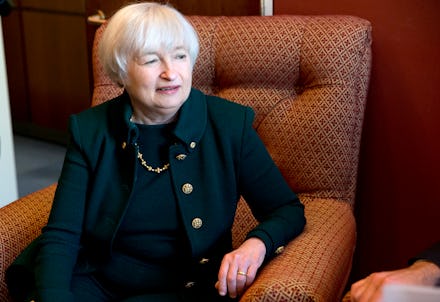Yellen Confirmation Hearings: Why You Should Care About What Happens At the Fed

I really, really wish the Federal Reserve would purchase my student loan debt. If other private entities can swap assets with the government’s bank, I’d like a piece of that action. And while we're at it, since federal government spending is frozen in austerity mode, I’d also appreciate some out-of-the-box thinking on secondary stimulus, even if it would be comparatively weak without a boost from Congress. Unfortunately, you can add the purchase of student debt to a long list of creative policies that the next Fed chair is unlikely to consider.
Thursday, Dr. Janet Yellen appears before Congress in anticipation of becoming what many deem the second most influential public official in the world. In the imagination of some Americans, the Fed chair is an all-powerful monetary maestro who conducts the economy from on high. Yet the position is not as powerful as that image suggests, and Yellen’s role and legacy will most likely be determined by Fed operations that don't have to do with monetary policy.
In the aftermath of the Dodd-Frank Act, the Federal Reserve is charged with several additional responsibilities, most notably concerning bank regulation. Complementing its legislative mandate to promote price stability and maximum employment, the agency is obligated to monitor the financial services industry. In fact, given the number of new duties it assigns the Fed, the Dodd-Frank Act proposed dividing the responsibilities of the Fed chair among two officials: The chair would be responsible for monetary policymaking, and a new vice chair would supervise regulation. This option has yet to be exercised, so it appears Yellen will serve in both roles.
In the United States, financial regulation is administered by a set of agencies gathered under the umbrella of the new Financial Stability Oversight Council. Together, they have tremendous flexibility to interpret financial regulations as they see fit. The Fed, specifically, plays a leading role in overseeing the snails-pace implementation of the Dodd-Frank Act itself. Its Board of Governors monitors the U.S government’s payment systems and manages 12 regional reserve banks that have additional regulatory supervision over roughly 40% of U.S. commercial banks. Furthermore, the Fed is required to create new standards for systemically important financial institutions (SIFIs) and bank holding companies (BHCs) in order to "prevent or mitigate risks to the financial stability of the United States.” At a minimum, Dodd-Frank requires the Fed to adopt enhanced risk-based capital requirements, leverage limits, liquidity requirements, risk management rules, risk concentration limits, credit exposure reports, and perhaps most importantly, requirements for resolution plans — “living wills” for times of distress. All of these measures are ultimately designed to require financial institutions to be more transparent, take on less risk, and hold a larger portion of their assets in liquid form.
Overall, Yellen’s record on these issues, and on financial regulation as a whole, is fairly mainstream. A former Clinton appointee, she doesn’t appear to be a visionary reformer, but she supports Dodd-Frank and increased surveillance generally. Compared to previous candidates for the job, she appears to have a more tenuous connection to Wall Street and the Rubinite Billionaire Boys Club. Yellen has an opportunity to be a steadfast Fed chair, with a commitment to institutional oversight like that of Depression-era Chair Marriner Eccles. She has almost unparalleled operational intelligence and will hopefully provide some insight on macroprudential measures to stabilize the financial system.
I hope Yellen will be confirmed. Were it not for a sexist backlash, she probably would have been already. Millennials should watch Yellen and the Fed closely. Ultimately, the central bank should be treated less like an untouchable celebrity policymaker and should be statutorily reformed to serve the public purpose in more direct ways. However, in the meantime, developing a grasp of how the central bank operates is crucial to understanding how money ebbs and flows through institutions, and who gets what in this country.